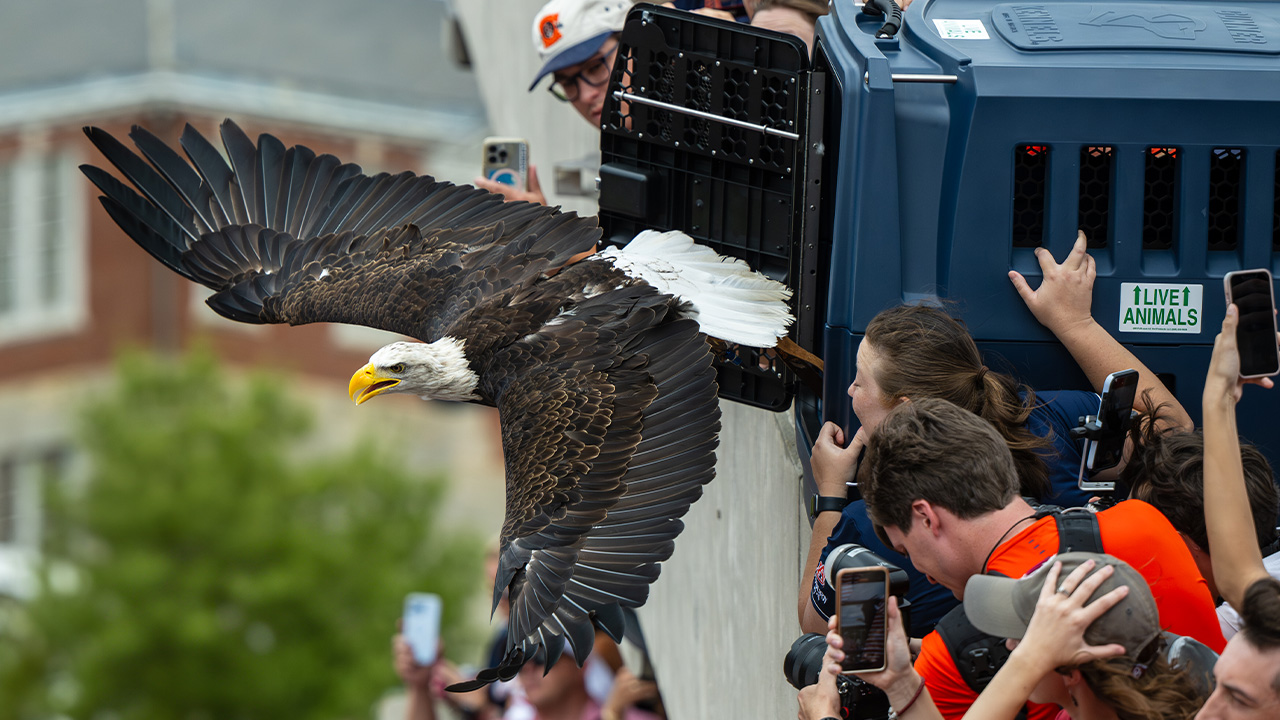content body

It’s a pre-game tradition that’s not to be missed: an eagle from the Auburn University Raptor Center (AURC) circles Jordan-Hare Stadium before landing midfield to a booming chorus of “War Eagle, hey!”
This fall, that famed tradition turns 25 years old, and the AURC, which is housed in the College of Veterinary Medicine, is celebrating with a campaign — from now through the Iron Bowl on Nov. 29 — to raise awareness and philanthropic support for the training and care of its raptors and community education efforts.
While many football fans are familiar with the center because of the famous pre-game flights, most do not realize it’s one of the top raptor rehabilitation centers in the Southeast.
Each year, staff members provide expert veterinary care to rehabilitate more than 300 injured or ill raptors — hawks, owls, falcons and eagles — with the goal of releasing them back into the wild whenever possible.
Almost two dozen raptors whose injuries left them too vulnerable to be released are permanent residents of the center, and it’s also home to four eagles that have flown pre-game: Nova, Spirit, Indy and Aurea.
Beyond the game
“The birds at the Raptor Center each have their own story, their own presence and their own role in this place,” said Robyn Miller, AURC’s director. “Providing lifelong care means meeting real needs — from medical treatment to enrichment — and while costs continue to rise, our commitment never wavers. It’s not a duty we take lightly — it’s an honor.”
Your donation will support the training and care of raptors and community education efforts at the AU Raptor Center.
Make a giftRaptors brought to the AURC are battling illness and disease or have ailments like feather damage, puncture wounds, broken bones or eye injuries. With medical intervention, the life expectancy of these birds is doubled, but just as patients in a hospital can accumulate a long list of charges for care, costs for raptors add up too.
Upon arrival, each raptor has an exam along with any necessary blood work, x-rays and other imaging. Based on those tests results, treatment can include surgery, medication and therapy.
With an average stay of 78 days under specialized care, it’s easy for a raptor to rack up thousands of dollars in bills. To give them the best chance of returning to their natural habitats, the AURC provides roughly $150,000 worth of patient care each year.

One of the most celebrated traditions in college football, Auburn's pregame eagle flight in Jordan-Hare Stadium is celebrating 25 years.
“Our release rate is unusually high, largely because of our relationship with the College of Veterinary Medicine,” Miller said. “We’re throwing everything we have at these birds to give them a second chance at life in the wild.”
While the funds raised during this campaign will support caring for raptors, they will also bolster the center’s educational offerings, which include more than 300 free events each year, with staff presenting lessons on raptor habitats, ecology and conservation in schools, daycares, businesses and retirement homes.
Groups of 24 or fewer people can book a free guided tour of the enclosure that houses the center’s permanent residents, while groups of 25 or more can book a private educational presentation.
One of the center’s most popular offerings is “Football, Fans and Feathers,” held each Friday before home games at 4 p.m. Gifts made during this campaign will be used to expand and modify the educational amphitheater area where this and other educational programs take place.
Donors who support the AURC can receive limited edition merchandise, exclusive communications and naming opportunities as well as attend donor appreciation events.
“This is a fundraising campaign, but it’s also an invitation to rally our community behind this iconic symbol of Auburn University,” Miller said. “It’s a celebration for anyone who’s ever felt inspired by an eagle flight.”




